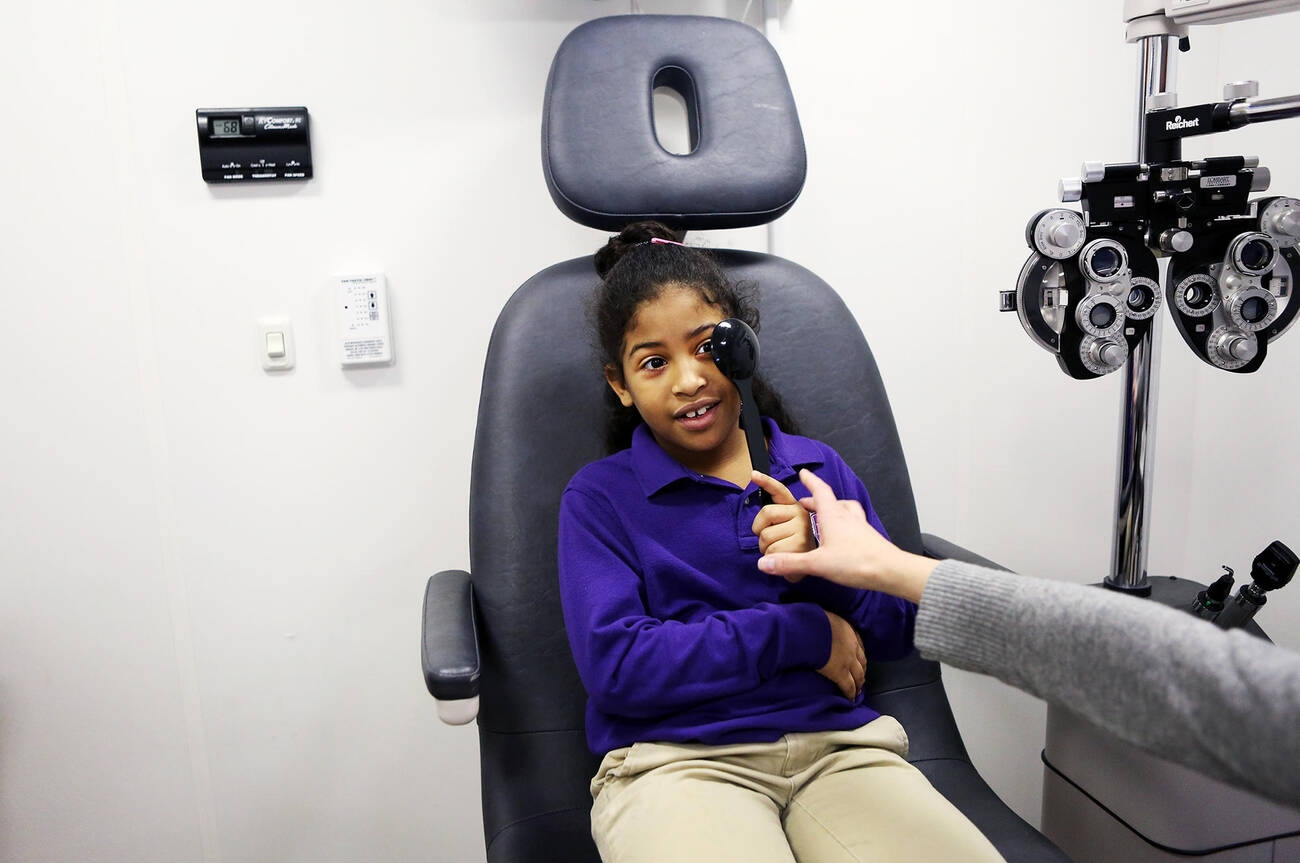Do you know that vision screening in children is crucial for their overall health and development? The vision center of their brain doesn’t fully develop until around age seven. If any vision problems go undetected and untreated during childhood, they can have long-term effects on both vision and mental health. That’s why regular screenings are essential to keep your child’s eyes healthy and catch any issues early on. Remember, screenings are different from eye exams – they’re a precautionary step before an exam, focusing mainly on visual acuity tests. Consult with your pediatrician to understand when and how often your child should have a vision screening.
Development of the Vision Center in Children
The vision center of your child’s brain isn’t fully developed until around age 7. This is why pediatric vision screening is important, especially for preschoolers and children. Vision screenings play a crucial role in detecting any discrepancies in eyesight and ensuring the proper development of the vision center in children. By identifying potential vision problems early on, these screenings can help prevent future complications and promote healthy eye health. Regular vision screenings are essential to monitor your child’s visual health as they grow. So make sure to schedule them annually or consult with your pediatrician if you notice any signs or symptoms of struggling with sight. Remember, taking care of your child’s vision now can have a significant impact on their overall well-being later in life.
Impact of Vision and Mental Health Problems
Identifying and addressing vision and mental health problems in young children is crucial for their overall well-being. Here’s why it’s important:
- Vision screening tests: Regular eye screenings can help detect any discrepancies in a child’s eyesight, ensuring early detection and intervention if necessary.
- Impact on mental health: Vision problems can have a significant impact on a child’s development and learning, leading to difficulties in academics and poor coordination.
- Importance of vision screening tools: Vision screening tools are essential for identifying children with vision disorders, allowing them to receive the necessary eye examinations and follow-up care.
February: AMD/Low Vision Awareness Month
February is when we raise awareness for AMD/Low Vision. It’s important to prioritize vision screening in children during this month and throughout the year. Regular vision screenings are crucial for maintaining healthy eyes and detecting any discrepancies in eyesight. By incorporating routine vision screenings into a child’s healthcare, we can ensure early detection and intervention if necessary, preventing potential vision problems from affecting their development and learning. As part of AMD/Low Vision Awareness Month, it is essential to understand the importance of vision screening for children and the impact it can have on their overall well-being. Don’t hesitate to consult with a pediatrician or healthcare provider to schedule a vision screening for your child and address any concerns about their visual health.
Benefits of Regular Vision Screening Tests
Regular vision screenings are crucial for maintaining healthy eyes and ensuring early detection and intervention if necessary, promoting better overall visual health in kids. Here are the benefits of regular vision screening tests:
- Early Detection: Vision screenings can detect discrepancies in eyesight at an early stage, allowing for timely intervention and management of eye-related issues in children.
- Preventing Future Problems: Regular vision screening tests can help prevent or manage eye-related diseases that may appear later in life by identifying potential problems early on.
- Promoting Academic Success: Good vision is essential for academic success, and regular vision screenings ensure that children have the visual skills necessary to read and learn effectively.
Detecting Discrepancies in Eyesight
If you notice any signs of struggling with your sight, such as squinting or constantly rubbing your eyes, it’s important to schedule a vision screening. Vision screenings in children are crucial for detecting discrepancies in eyesight. It is especially important because children may not always be able to communicate their vision problems effectively. Regular vision screenings can help identify any potential issues early on, allowing for prompt intervention and management. By detecting discrepancies in eyesight at an early stage, vision screenings can prevent further complications and promote optimal eye health in children. Remember that taking care of your child’s eyesight is important for their overall well-being and success in various aspects of life, including academics and daily activities.
Vision Screening Vs Eye Exams
Screenings are typically done as a precautionary step before scheduling an eye exam. It’s important to understand the difference between vision screenings and eye exams. Here’s what you need to know:
- Vision screenings are visual acuity tests that detect discrepancies in eyesight.
- Eye exams, on the other hand, check the health of your eyes and can detect serious eye problems.
- While vision screenings are a helpful tool, it is still crucial to have regular comprehensive eye exams to ensure overall eye health.
Timing of Vision Screening
The timing of vision screening varies depending on the age of your child and their developmental milestones. Vision screenings are important to ensure the health of your child’s eyes. So, what is vision screening? It is a simple eye vision test that helps detect any discrepancies in your child’s eyesight. But how do you do vision screening? Well, it usually involves visual acuity tests where your child will be asked to read letters or identify shapes on a chart. The frequency of vision screenings may vary, but generally, comprehensive exams for newborns and infants are recommended. Pediatricians assess the need for vision screening around the age of three, and annual screenings are suggested for school-age children. If you notice any signs or symptoms of struggling with sight, it’s important to schedule a vision screening with your pediatrician.
Signs of Struggling With Vision
In the previous subtopic, you learned about the timing of vision screening for children. Now, let’s discuss the signs that indicate your child may be struggling with their vision. It’s essential to pay attention to these signs and take prompt action by scheduling a vision screening if you notice any of them:
- Squinting: If your child frequently squints, it could be a sign that they are trying to compensate for blurry or unclear vision.
- Headaches or sensitivity to light: These symptoms may indicate eye strain caused by visual difficulties.
- Struggling with academics: Vision problems can make it challenging for children to read, write, and comprehend information properly.
Importance of Consulting With Pediatrician
If you have any concerns about your child’s eyesight, it’s crucial to consult with their pediatrician. Your child’s vision is an important developmental tool, and it’s important to address any potential issues early on. February is dedicated to eye awareness, making it the perfect time to schedule a visit with your child’s pediatrician for a vision screening. They will determine when eye exams and vision screenings are needed based on your child’s age and overall health. Pediatric Care Group offers comprehensive vision screenings for children of all ages. By consulting with their pediatrician, you can ensure that your child receives the necessary care and support for optimal vision health. Don’t hesitate to reach out if you have any concerns or questions about your child’s eyesight.
Understanding Visual Health and Its Impact on Education
To ensure your child’s success in school, it is crucial to understand the impact of visual health on their education. Here are three key points to consider:
- Visual skills play a vital role in academic success: Good visual abilities, such as visual acuity, eye focusing, and tracking, are necessary for children to read and learn effectively. As they progress through school, these skills become increasingly important.
- Regular vision screening can identify deficits in these skills: Vision screenings can detect any discrepancies in your child’s eyesight and prompt appropriate interventions if needed. Early detection and intervention can prevent or manage potential vision problems that may affect their learning.
- Ongoing monitoring of visual health is essential: Starting comprehensive vision tests at a young age allows for early detection of any high-risk eye issues. Annual screenings throughout childhood ensure continuous monitoring and promote better overall vision health.
Understanding the importance of visual health and ensuring regular vision screenings can greatly contribute to your child’s educational success.





